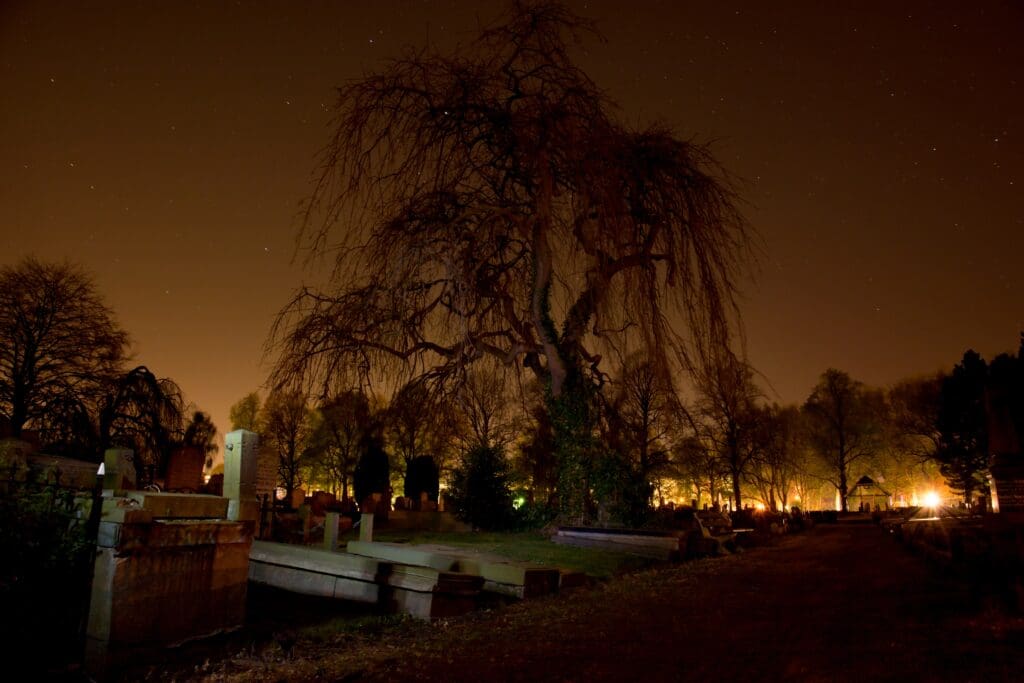#NPM18: 13 SPOOKY POEMS AND POETRY TIDBITS FOR FRIDAY THE 13TH | GUEST POST BY DOMENICA MARTINELLO
“April is the cruelest month,” writes T.S. Eliot at the beginning of The Waste Land. Along with breeding lilacs out of the dead land etc., April is also National Poetry Month! But this National Poetry Month is arguably even crueler—or cooler—than ever, due to the inclusion of an auspicious date: Friday the 13th.
Poetry casts spells. It often has a dark glimmer in its eye, a vaguely occult air, a witchy bend, a scary twist, a mystic thrust, and sometimes even an astrological chart. So let’s grab our sage and salt as we embrace the spooky and superstitious this National Poetry Month. Here are thirteen poetry things to get you into the Friday the 13th… spirit.

“Superstition” by Amy Lowell
Begin the festivities with Amy Lowell’s bite-sized, fittingly titled poem “Superstition.” A proponent of the imagist movement, it’s no wonder Lowell’s poem opens with the startling apparition of a kite hanging from a tree… with a ghost painted on it. Try to get that image out of your head.
Shakespeare’s Tombstone
Sure, the Weird Sisters and their witchy incantations are one of the highlights of Macbeth – a play full of blood, murder, ghosts, prophecies, and tricks. Dark prince Hamlet and his ghost-dad are also prime candidates for this supernatural list.
But here’s a lesser-known fact about William: have you seen Shakespeare’s actual gravestone? Here’s how it reads:
Good friend, for Jesus’ sake forbeare
To digg the dust enclosed here!
Blest be ye man that spares thes stones
And curst be he that moues my bones.
Leave it to Shakespeare to come up with the creepiest way to say “stay off my lawn!”
I felt a Funeral, in my Brain, by Emily Dickinson
Speaking of graves, Emily Dickinson dials things up a notch. There’s something particularly chilling about feeling possessed by a funeral procession, right? Dickinson’s enigmatic poem I felt a Funeral, in my Brain, is well known for portraying a descent into madness through the use of this unsettling metaphor.
While it’s a clever move to portray sanity as actually dying, Dickinson’s poems are never quite as straightforward as that. All I know for certain? The lines “I heard them lift a Box / And creak across my Soul” makes my chest feel tight.
W.B. Yeats and the Occult
Irish poet W.B. Yeats is one of the most famous writers of the 20th century, inspiring the likes of John Berryman, Theodore Roethke, and W. H. Auden (who biblically pronounced Him the “saviour of English lyric poetry“). While readers might be familiar with the religious overtones in poems such as “The Second Coming,” Yeats had a strange passion for mysticism, the paranormal, fairies, changelings, and the occult, all well documented in his writing.
An extreme example? Yeats’ composed the book-length mystical manifesto A Vision: An Explanation of Life Founded upon the Writings of Giraldus and upon Certain Doctrines Attributed to Kusta Ben Luka (simply referred to as A Vision for obvious reasons) after over four hundred automatic writing sessions with his wife George. The tome has something to do with gyres, moon phases, astrology, and the reincarnation of the soul, among other things.
If he were alive today, I’d like to posit that Yeats would be an Instagram Witch (#instawitch), posing with his array of fine mystical crystals.
“Omens” by Cecilia Llompart
Cecilia Llompart’s dark, searching, dreamlike poem “Omens” is full of startling lines and images that dare the reader to try and resist the realm of superstition, intuition, and the subconscious.
“We once tended oracles,” the poem asserts. What happens when we stop tending them? What are we doing instead? “Even a small cut can sing all day,” the poem continues elsewhere. Dead birds, chalk outlines, and drowned men all culminate in an incredibly ominous ending.
Sylvia Plath and Ouija
Though Plath scholars contest her actual investment in the occult, Ted and Sylvia were no strangers to trying to chat with ghosts by playing with a homemade ouija board, which Plath describes in her journals as “more fun than a movie.” (Fun fact: the idea to experiment with ouija came from the writings of W.B. Yeats!)
Dabbling in the occult, even just for entertainment purposes, seemed to have been a creative stimulus nonetheless, as evidenced in Sylvia Plath’s poem “Ouija.”
Leonard Cohen and Hypnosis
Maybe he’s born with it, maybe it’s—hypnosis? The notoriously magnetic poet and folk hero from Montreal may have relied on more than just his charisma to win people over. Several Cohen biographers note that as a boy he studied mind reading, magnetism, and clairvoyant hypnosis, soon discovering that he quite a knack for all three.
In David Remnick’s profile for The New Yorker, published only a month before Cohen’s death, Remnick offers the following infamous anecdote: “When [Cohen] was thirteen, he read a book on hypnotism. He tried out his new discipline on the family housekeeper, and she took off her clothes.” Creepy!
“Herbert White” by Frank Bidart
One of the most disturbing persona poems every written is Frank Bidart’s “Herbert White,” a dramatic monologue voiced by a child-murderer. Mixing elements of his own childhood in California with gruesome details lifted from a lewd, pseudo-psychology book from the 60s, the character of Herbert White is both appalling and appallingly human.
Further proof that “Herbert White” is Very Haunted and Extremely Cursed? James Franco adapted the poem into a short film and named his debut book of poetry Directing Herbert White.
The Poet Character in mother!
Most poets are already embarrassed of themselves or grapple with major god complexes. We (and our confused and well-meaning friends and family) do not need to see poets portrayed as egomaniacal Creators in one of Darren Aronofsky’s trite biblical allegories.
I could write a whole philosophical essay on why The Poet in mother! is the worst, but let’s simply consider this: The Poet spends most of the movie trying to write a single poem to end his years-long bout of writer’s block. When he finally writes one (1) poem, he shows it to his wife, who weeps at its genius while he watches—ah, sweet satisfaction! The Poet then immediately talks to his publisher (after writing ONE POEM) and nine months later he has a “bestselling” book. Oh, and masses of people line up in front of The Poet’s pastoral mansion-house to get his autograph. But it’s okay because the entire film is an allegory. Cringe.
Astro Poets
It’s official: Poets love astrology. First there was Ariana Reines’ astrology project Lazy Eye Haver, and now there’s the viral twitter sensation Astro Poets (@poetastrologers)! The Astro Poets are Dorothea Lasky and Alex Dimitrov, and they have amassed quite an online following, even scoring an ongoing astrology column for W Magazine.
As a Gemini Sun, Capricorn moon, and Gemini ascendant, the Astro Poets make me and my multiple personalities feel seen.
“Bats” by Paisley Redkal
On one level, Paisley Redkal’s “Bats” is pretty self-explanatory. There are many startling metaphors—bats hanging, each “a jagged, silken sleeve… bright / as polished knives.” Bats that flutter and “shake like mystics.”
But on the other hand, “Bats” also employs the darkly maternal imagery of supersonic babies, empty wombs, dry fruit, and “underthings found tossed upon the martial bed.” Surprising pairings give birth to a highly unique and effective poem that makes the body feels downright creaturely.
Voodoo Hypothesis by Canisia Lubrin
“Alight with magic,” says the CBC, Lubrin’s debut collection Voodoo Hypothesis “traverses time and space, exploring topics of race, oppression and colonialism through a folkloric lens.” Referencing St. Lucia folkloric figures such as Papa Bwa, while also dismantling the pejorative understanding of voodoo bokor, or “black magic,” Lubrin breaks the spell of a colonizing whiteness so familiar that it’s often invisible.
As the poet writes in the collection’s final long poem, “Epistle to the Ghost Gathering”: “Choosing to fight our urge for flight / Our brilliance indistinguishable from magic.”
The Raven by Edgar Allen Poe
The poem that launched a thousand parodies: No spooky poetry list would be complete without Edgar Allen Poe’s 1845 classic “The Raven.” Arguably one of English literature’s hottest poems, “The Raven” has everything—sad naps, talking birds, dreary midnights, forgotten lore, rare and radiant maidens, uncertain rustlings, and a slow decent into madness.
A master class on mood, musicality, and allusion, “The Raven” is a good reminder to ignore that rapping and tapping on the chamber door this Friday the 13th.
—

Domenica Martinello is the author of the forthcoming book of poetry All Day I Dream About Sirens (Coach House Books, 2019). Originally from Montréal, she is currently completing her MFA at the Iowa Writers’ Workshop and tweets @domenicahope

